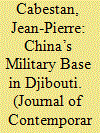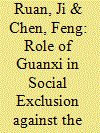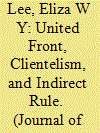|
|
|
Sort Order |
|
|
|
Items / Page
|
|
|
|
|
|
|
| Srl | Item |
| 1 |
ID:
173264


|
|
|
|
|
| Summary/Abstract |
Reverse migration has mitigated the brain drain for many Asian countries. But can developing countries actually bring back their best overseas talent? How can this studymeasure the quality of that talent? And, if the best are not returning, why not? Is the ‘institutional culture’ within the scientific and academic institutions the cause? The authors address these questions by comparing full-time and part-time returnees in three national programs, using each scholar’s h-Index, the impact factor of the journals in which they publish, and the annual number of publications by each researcher. The findings show that, circa 2012–13, the strongest researchers returned only part-time. Second, returnees to the Chinese Academy of Sciences were weaker than returnees under national programs at universities. And third, universities whose presidents reformed the institutional culture at the school attracted better overseas talent than other universities. The findings, then, show that resistance to institutional change can undermine a state’s effort to promote its research and development while domestic reform can promote that endeavour.
|
|
|
|
|
|
|
|
|
|
|
|
|
|
|
|
| 2 |
ID:
173261


|
|
|
|
|
| Summary/Abstract |
This article analyzes China’ and the People’s Liberation Army (PLA)’s rationale in opening what it calls a ‘logistical support facility’ in Djibouti as well as the missions that it is supposed to fulfil. The author also presents this base’s activities since its opening on 1 August 2017 and explores the potential role that the Chinese military stationed in Djibouti could play to secure Xi Jinping’s Belt and Road initiative and protect Chinese interests and nationals in Africa or the Middle East. Finally, it assesses the PLA base’s relations with other militaries present in Djibouti, particularly the US, the French and the Japanese, concluding that Djibouti operates as a microcosm of a multipolar world heading towards a bipolar, though asymmetrical, world order.
|
|
|
|
|
|
|
|
|
|
|
|
|
|
|
|
| 3 |
ID:
173260


|
|
|
|
|
| Summary/Abstract |
Much scholarly attention has been devoted to the subject of whether and how social connections affect political trust. China provides a critical case because of the unique guanxi networks and the symbiosis between the state and non-governmental associations. In the Chinese context, this analysis proposes that: 1) informal social ties impair political trust since guanxi networking offers provisional publics the transmission of political stimuli, 2) formal social ties foster political trust because associations and the state coexist in a state-dominant symbiotic sphere that brings about political trust assimilations by helping associations realize their agendas and interests. Based on survey data from urban China, findings from both standard models and auxiliary instrumental variable analyses generally support these predictions.
|
|
|
|
|
|
|
|
|
|
|
|
|
|
|
|
| 4 |
ID:
173258


|
|
|
|
|
| Summary/Abstract |
Rising income inequality and the surge of civil disorder are two important socio-economic phenomena in contemporary China. This article empirically explores the relationship between inequality and the occurrence of mass incidents at the county level. The results show that in counties with higher income inequality, mass incidents tend to happen with a larger probability. Two psychological transmission channels exist: income inequality will make individuals not only feel unhappy and unsatisfied with their lives but also feel unsatisfied with the government, both of which will lead to a larger occurrence possibility of mass incidents. A significant proportion of mass incidents are associated with the encroachment on citizens’ economic interests and on the relationship between the public and the government.
|
|
|
|
|
|
|
|
|
|
|
|
|
|
|
|
| 5 |
ID:
173257


|
|
|
|
|
| Summary/Abstract |
Based on in-depth field research in an urban housing demolition and relocation project in J community, Jiangsu province, this article explores the strategies, mindset, and considerations employed by three levels of local authorities (the neighbourhood committee, the district and municipal governments) in resolving conflict with tough nail households. Such investigation highlights the combined discourse surrounding the ‘bargained authoritarianism’ concept and ‘accident avoidance’ principle in the context of ‘maintaining social stability’ (weiwen in Chinese) in China. The conclusion of this article adds to the interpretation of the perpetuating conflicting relationship between central and local in China. This article thus suggests that a shift in approach is required when local authorities establish legal procedures and regulations to manage increasing social conflict in China.
|
|
|
|
|
|
|
|
|
|
|
|
|
|
|
|
| 6 |
ID:
173256


|
|
|
|
|
| Summary/Abstract |
This article draws on analysis of local policy documents and migrant and official interviews to explore the development, implementation and impacts of two aspects of China’s 2014 hukou reforms that have been less scrutinised than the abolition of the rural/urban distinction: the mandatory use of residence permits and points systems for migrants to cities with a population over 5 million. Taking migrant education as a case study, and focusing on Shanghai, Shenzhen, and Beijing, it argues that central and local priorities are more about population control than social equality. Far from their stated aims of equalizing migrant services with locals, the policies introduce new forms of educational and social stratification, aimed at increasing control over migrant selectivity, with far-reaching consequences for Chinese social development.
|
|
|
|
|
|
|
|
|
|
|
|
|
|
|
|
| 7 |
ID:
173259


|
|
|
|
|
| Summary/Abstract |
This article is based on two case studies of social exclusion in two Chinese villages against the background of social stratification.Five types of social exclusion of the poor—housing, marriage, renqing, ritual, and gossip exclusion—are identified, which shrink the guanxi networks held by the poor. This in turn weakens their social and ritual capital and lowers their social status,leading to the reproduction of inequality. The research presented here finds that the vertical exclusiveness of guanxi, which is based on the concepts of in-group and out-group separation, superior and inferior separation, and symmetrical reciprocity, results in social exclusion of the poor. This process is underpinned by the instrumental use of the traditional Confucian ritual(li), in which ideas of modern social welfare, equality, and universalism are insufficient.
|
|
|
|
|
|
|
|
|
|
|
|
|
|
|
|
| 8 |
ID:
173265


|
|
|
|
|
| Summary/Abstract |
Although China has implemented a universal two-child policy to increase its low fertility rate, many Chinese couples still hesitate over having a second child. The existing literature focuses on how various factors affect reproductive decision-making in different social contexts, paying less attention to family dynamics and intra-family negotiation in the process of reproductive decision-making. Drawing on qualitative data obtained from 53 urban parents in China, this study enriches the discussion by examining how the decision of whether to have a second child is negotiated among multiple family members. Applying the interpretive perspective, this study analyzes the narratives, actions and tactics of family members with conflicting reproductive preferences and reveals how they shape each other’s reproductive decisions in the dynamic process of intra-family negotiation. It sheds new light on the reproductive politics in urban Chinese families by focusing on how the two-child policy is negotiated and contested at the micro-level and by highlighting the complexity and fluidity of the relational process of reproductive decision-making.
|
|
|
|
|
|
|
|
|
|
|
|
|
|
|
|
| 9 |
ID:
173262


|
|
|
|
|
| Summary/Abstract |
This article examines the recent rise of Islamophobic narratives in the Chinese cyberspace. Using content analysis of social media headline articles, this article argues that key Islamophobic actors in the Chinese cyberspace have constructed a ‘victims and villains’ narrative to effectively ‘other’ Muslim populations in China. By implying that non-Sinicised Muslims are under Arab fundamentalist influences, religious autonomy becomes political betrayal and Islamophobia is legitimised. Elements of Islamophobia is then subsumed in the official narrative calling for ethnic loyalty to the Chinese nation, which presents a unique challenge to the Chinese Party-state as Islamophobic discourses both legitimises state-sponsored autocratic control in Muslim regions, but also could potentially bring destabilisation to an already fragile ethnic relationship between Muslim minorities and the Han majority.
|
|
|
|
|
|
|
|
|
|
|
|
|
|
|
|
| 10 |
ID:
173263


|
|
|
|
|
| Summary/Abstract |
United front organizations in Hong Kong have evolved into a form of patron-client network, with the Liaison Office of the Central People’s Government in the Hong Kong Special Administrative Region (Liaison Office) assuming the role of the patron. Possessing the capacity to penetrate into the community and offer patronage goods, these organizations have become the basis for the Liaison Office to build a political machine, discipline elites and maintain their cohesion, control the executive, and counterbalance civil society. The closely knit clientelist network functions as a para-party machinery, supporting the Liaison Office to operate as a quasi-ruling party. On the other hand, immense social resentment has culminated over the Chinese party-state’s (party-state’s) infringement on the autonomy of the Hong Kong Special Administrative Region (HKSAR).
|
|
|
|
|
|
|
|
|
|
|
|
|
|
|
|
|
|
|
|
|